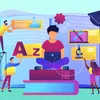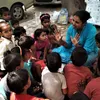How the Indian education space is celebrating the 74th year of independence
SocialStory spoke to some of the educational institutions and NGOs to understand how they are celebrating Independence day in the new normal.
Since independence, India has seen several reforms in the education sector. The recently amended National Education Policy stands testimonial to this. After 74 years of Independence, India’s education sector is moving towards a holistic, flexible and pragmatic education system, paving the way to boost human capital development in the future.
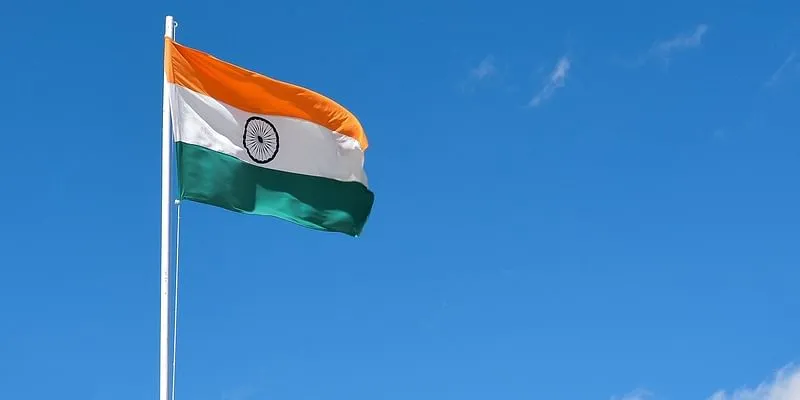
Representational image | Pixabay
While many are fortunate to avail education in this country, many students are still left on the sidelines, especially those in rural areas or belonging to the unprivileged section of society. In fact, amidst the pandemic and the subsequent lockdown, many students had to drop out of schools to help their families.
Each year, educational institutions across India mark Independence Day with much fervour. However, this year, the celebrations have moved to the online space due to the COVID-19 pandemic.
Schools in urban spaces are celebrating the day by holding competitions and more in the virtual space, while a few NGOs are trying to provide education to the kids in rural areas through lockdown programmes.
Here’s what is happening as a run-up to the Independence Day celebrations across India.
The new normal
Once the lockdown was announced, things took a different turn for students across India. In urban areas, students have been attending online classes for the last few months, and have been spending their school time in a virtual classroom.
For the underprivileged sections, with no access to smartphones as well as internet facilities, these students could not avail online classes. In fact, many of them also fell into child labour.
“Because of the COVID-19 pandemic, the child labour situation is increasing in our country. People have lost their jobs, and there is no learning happening; these students are falling back on their education,” expresses Richa Prashant, Founder of Sunaayy Foundation.
To prevent such a situation, NGOs like Sunaayy Foundation and Makkala Jagrithi are focussing on building a proper education system — bringing back the classrooms, and making learning better for children from the rural segments.
A ‘virtual’ commemoration
The new normal has put a halt to the traditional celebrations on August 15. To that effect, many educational institutions have planned virtual activities and programmes to celebrate the day.
Modern Public School, Delhi
Modern Public School has organised a week-long celebration starting August 10 to August 15. On each day, the school is showcasing a different kind of programme done by its students.
Singing patriotic songs, presenting the revolts in India from 1858 to 1947 in the form of dohas, performing mime acts, representing the events of Independence with music, creating artwork with sand, and performing shadow dances, are some of the programmes leading up to the Independence Day celebrations.
“On August 15, myself, along with a few teachers, who are the functionaries of the school, a few of the support staff, parents, and students, will be present for the flag hoisting. While it is not compulsory to attend, our school grounds allow enough space to maintain social distancing. The entire event will also be recorded on our YouTube channel. We will also be distributing tricolour masks to the attendees,” says Alka Kapur, Principal, Modern Public School.
In fact, Roti Bank, an NGO closely associated with MPS, will be distributing meals, as well as masks to the needy on the occasion.
Carmel High School, Bengaluru
Carmel High School is hosting an art, literature, and cultural event called E-Yugantara for Classes 6-10, from August 13 – August 15.
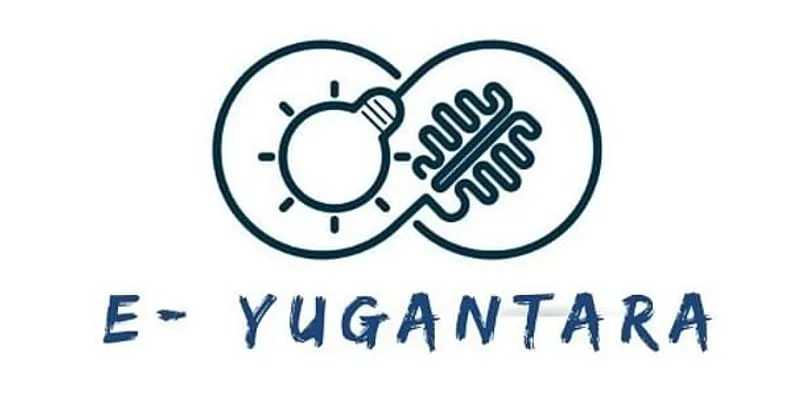
“Taking the advantage that August 15 is our Independence Day and that families will be together, we have organised many events like a Family Fashion walk, dance and music events, Best Out of Waste competition, mask designing, and others,” says Tapan Alexander Menezes, Head of the IT Department, Carmel High.
“We want to engage the students, and not just let them feel the burden of classes. I’m sure they miss the school building and classroom, but with this kind of event, they still tend to feel a part of the Carmel Family,” he adds.
Mar Athanasius International School, Kothamangalam, Kerala
On the occasion of Independence Day, the school is organising competitions like tricolour flower making, collage making competition, and speech competition on the topic ‘India in my dreams.’ These events will be organised for primary and middle-school students.
The students have also created a video as a run-up to Independence Day.
“We are encouraging students despite the lockdown, to help instil a sense of patriotism in them in every small way possible,” says Principal Anitha George.
Beyond celebrations
Meanwhile, many NGOs across India are working to help rural students find their way back to schools, and ultimately, become independent.
Sunaayy Foundation
Sunaayy will be releasing a survey to understand the impact of the disruption during the lockdown in the catchment areas of New Delhi, where it conducts its classes.
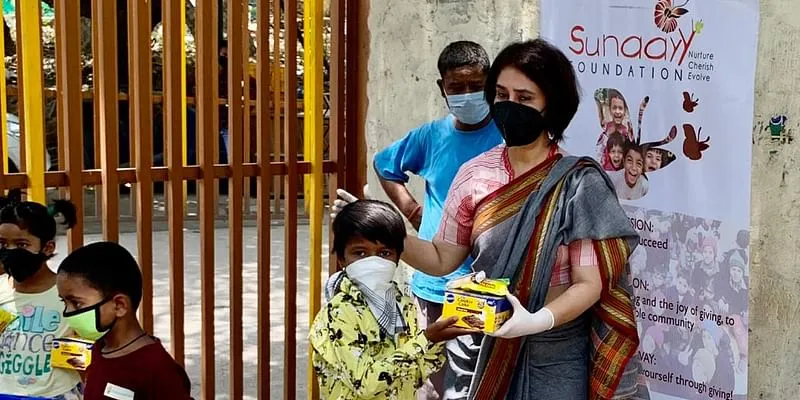
Distributing essentials to the kids during the lockdown
“We have interviewed a total of 200 households, comprising of 965 individuals from the informal urban settlements near the Vasant Kunj area in New Delhi. During the lockdown, our teachers, who were in constant touch with the families of our students, ascertained their essential needs and requirements over the phone. This information was crucial for us in formulating our strategy and response at an organisational level, says Richa Prashant, Founder, Sunaayy Foundation.
The NGO has been helping the families of its students by providing meals and essential items. Additionally, it is helping these children get back in touch with learning, including online education for a few.
Makkala Jagriti
Bengaluru-based Makkala Jagriti has been ensuring that unprivileged children in and around the city have access to education through its ‘Learning Under Lockdown’ programme.
According to Sunayana Chatrapathy, Chief Functionary of the NGO, as a small part of the celebrations, the NGO has planned small activities for three levels - anganwadi kids, government schools, and for the youth in the urban slums.
The children have been doing activities, including collage making, essay writing, fancy dress, and others. The children have been practising a dance routine for the last two weeks at their homes, which will be put together for tomorrow.

Fancy dress competition aligned with the Independence Day celebrations
The NGO has been providing learning kits with workbooks, colours, stationery, and soap to every child. The facilitators meet the children once a week to check their work, and also keep in touch with the students who have WhatsApp access, every day. You can help the NGO in its efforts by clicking here.
Edited by Suman Singh


